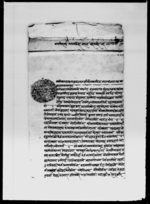A letter from Jagat Jaṅga instructing people from villages in Syārabhoṭ to consult Jimmāvāla Kaisāṅ Khunu regarding matters relating to lokābhāra contracts (VS 1934)
ID: E_3446_0007
Edited and
translated by Rajendra Shakya
in collaboration with
Pabitra Bajracharya
Created: 2019-11-22;
Last modified: 2021-02-05
For the metadata of the document, click here
The accompanying edition, translation/synopsis and/or commentary are available under the terms of the Creative Commons Attribution-ShareAlike 4.0 International License
Abstract
This letter from Jagat Jaṅga instructs both local functionaries and ryots in Syārabhoṭ to act in consultation with Jimmāvāla Kaisāṅ Khunu in matters relating to state revenue and to lend him support when he asks for it.Diplomatic edition
[1r]
1श्री\1श्रीपश्चिम्तर्फकाकम्यांडीङ्जनरलधीरसम्सेरजङ्राणावहादुर[Seal of Jagat Jaṅga Bahādura Rāṇā]1स्वस्तिश्रीमद्राजकुमारकुमारात्मजपूर्वतर्फकाकम्यांडीङ्जनरलश्रीजगतजङ्गवहा2दुरराणाकस्यपत्रम्∙¯¯¯ ¯¯¯ ¯¯¯ ¯¯¯ ¯¯¯ ¯¯¯ ¯¯¯ ¯¯¯
3आगेअठारसयेषोलामध्येस्यारभोट्∙सीवच्यातगाउतांजुगाउवालकगाउमेपा
4गाउचुमलिंगाउ∙लुत्रुगाउ∙तोपागाउयार्जुगाउपाचपार्वा∙वोर्सीगाउपारोगाउ
5निलुतगाउ∙ङाकगाउछीलुतगाउफुलवेगाउकामुषियाजेठावुढाघ्यापोरै
6तिगैह्रकेयथोचित्तउप्रान्त∙रोलले३४सालकावालीदेषीहजुरलाइआया
7को¯ ¯१¯साहेवकाषान्गीषुव़ाछदाअठारसयेषोलास्यारभोट्जगाकोलोकाभारठे
8ककानगदीजिन्सीवुझाउदारपट्टाकवुलीयेतफेरफारगर्नुपर्दाऔअरुजेकामपरीआय़ाप
9निजिम्माव़ाल∙ङव़ाङ्षुनुकोछोराकैसाङ्षुनुसगसल्लाहराषीकामकाजगर्नुके
10हिकामकाजपरीआउदामद्दतमाग्य़ोभन्यातिमीहरुसवैलेमद्दतदीनुभंन्या¯ ¯१¯वा
11टउर्द्दीकोदस्षतगरीवक्सदासोउर्द्दिवमोजीम्∙परीआयाकोकामकाजचलायाकोथी
12ञादोसाधकामुलुककोकामछसावीकवमोजीम्सनदगरीवक्स्यागाउगाउवाटलो
13काभारठेकवुझायानवुझायाकोगाउगाउकामुषीया∙फेरफार∙भयानभयापनिथा
14हाहुन्याथीयोकेहीकामकाजपरीआउदापनिहरकट्हुन्याछैनभनिसाविक¯ ¯१¯
15वाटगरीवक्स्या∙का३१सालफागुणसुदी६रोजकादस्षतस्मेतल्याइहाम्राहजुरमाविन्ती
16पार्दाजाहेरभयोतसर्थ¯ ¯१¯वाटअघीगरीवक्स्याकोदस्षत∙वमोजीम्आफ्नाआफ्ना
17गाउकोलोकाभार∙ठेकवुझाउदार∙पट्टाकवुलीयेतफेरफारगर्नुपर्दानिजजिम्माव़ालङ
18व़ाङ्षुनुकाछोराकैसांषुनुमार्फतगर्नुकेहिकामपरीआउदानिजजिम्माव़ालकैसां
19षुनुकासल्ला∙हसगगर्नुनिजजिम्माव़ाललेमद्दतमाग्योभन्यातिमीहरुसवैलेमद्दतदी
20नुसावीकदरीचलीआयावमोजीम्∙वाहालपनिचलाउनदीनुतिमीहरुलेयोले
21षीव[?]∙कोउर्द्दीवमोजीम्∙गर्यानौभन्याअैनवमोजीम्∙तिमिहरुलेवुझाउ
22नुपर्लासोवुझीकामगर∙इतिसम्वत्१९३४सालमितीमाघशुदी१०रोज३शुभम्¯¯¯ ¯¯¯ ¯¯¯ ¯¯¯ ¯¯¯ ¯¯¯ ¯¯¯ ¯¯¯
Translation
[1r]
Western Commanding General Dhīra Śamśera Jaṅga Rāṇā Bāhādura – 1
[Seal of Jagat Jaṅga Bahādura Rāṇā]
Hail! A letter from the venerable Eastern Commanding General Jagat Jaṅga Bahādura Rāṇā, a prince born of a prince
Āge: To the mukhiyās, jeṭhā-buḍhās, ghyāpos1 , ryots and the like of Sivacyātagāũ, Tāṃjugāũ, Balākagāũ, Mepāgāũ, Cumaliṃgāũ2 , Lutrugāũ, Topāgāũ3 , Yārjugāũ, Pācapārvā4 , Borsigāũ, Pārogāũ, Nilunagāũ5 , Ṅākagāũ, Chīlunagāũ6 , [and] Phulavegāũ of the Syārabhoṭ sector of the Aṭhāra Saya Kholā region
Yathocita uprānta: “In regard to the khuvā[s] [of] the khānagī of [Western Commanding General Dhīra Śamśera Jaṅga [Kũvara] Rāṇā]7 that were transferred to you (i.e., Jagat Jaṅga) from the harvest of the year [VS 19]34 (1877 CE) onwards in accordance with the [Rāṇā] Roll [of Succession], we have been doing any work that needs to be performed in accordance with an order signed by [Western Commanding General Dhīra Śamśera Jaṅga Kũvara Rāṇā] which states: 'When submitting cash and kind from lokābhāra revenue on—and when needing to amend the lease contract for—land in the Syārabhoṭ [sector] of the Aṭhāra Saya Kholā region, or whenever there is any work to be carried out, act in consultation with Kaisāṅ Khunu, son of Jimmāvāla Ṅavāṅ Khunu. If [he] asks for any assistance in time of need, offer it [to him].'
“There is work relating to the borderland region. If [you] had issued a sanada as usual, [you] would have known whether or not the lokābhāra revenue from the villages has been submitted and whether there have been any changes in [the appointment] of mukhiyās in the villages. Also, there will be no improper conduct when work needs to be carried out.”
This came to our notice after the supplication was submitted to us with the aforementioned details along with a missive (daskhata) from [Western Commanding General Dhīra Śamśera Jaṅga Kũvara Rāṇā] signed on the 6th of the bright fortnight of Phalguṇa in the year [VS 19]31 (1875 CE).
Therefore, in accordance with the missive previously signed by [Western Commanding General Dhīra Śamśera Jaṅga Kũvara Rāṇā], whenever you submit lokābhāra revenue from your villages, and whenever you amend a lease contract, do so through Kaisāṅ Khunu, son of Jimmāvāla Ṅavāṅ Khunu. Whenever anything needs to be done, do so in consultation with the said Jimmāvāla Kaisāṅ Khunu. If the said jimmāvāla asks for any assistance, you all shall offer it [to him]. Allow [him] to [collect and] use the rent that has been regularly imposed. You shall have a price to pay in accordance with the Ain if you do not comply with what is written in this order. Be informed [of this] and act [accordingly].
Tuesday, the 10th of the bright fortnight of Māgha in the [Vikrama] era year 1934 (1878 CE). Auspiciousness.
Commentary
This document from Jagat Jaṅga, confirming the authoritative status of Jimmāvāla Kaisāṅ Khunu in the 14 villages of Syārabhoṭ, instructs local functionaries and ryots of the region to consult with the latter in connection with any work relating to the state, and to assist him whenever he asks for help. It warns them that they will be penalized if they do not follow the instructions spelled out in this document. It thus lays bare the manner in which the state made its presence felt in mofussils during that period: someone from the region is appointed as jimmāvāla and authorized to perform civil duties on behalf of the state. As we know from another document, E_3446_0006, dated VS 1948 (1891 CE), the appointment of a jimmāvāla was a democratic process, since the appointee was required to get the consent of both the local people and local functionaries (mukhiyās etc.) before the state would approve his appointment through a jimmāvālīpaṭṭā, a contract that authorized him to assume the post. His main function was to collect revenue and deposit it in the state treasury. We know from other lokābhāra lease contracts from the region that the state appointed a hākima as well, who was sent from the centre and adjudicated lawsuits against mukhiyās and jimmāvālas, and cases that local functionaries failed to settle. The centre had also sent tahasiladāras and dvāres to collect revenue, but when the local functionaries complained that it was bothersome for them to serve such collectors, the state agreed not to further dispatch them and authorized the jimmāvāla to collect the revenue. The central administration also appointed an officer from the military to look into such bilateral issues as border disputes. Two documents from the region, E_3446_0028 and L_1200_0027, deal with a border dispute with Tibet. These documents show that SubedāraSaraṇabhadra Silavāla Kṣetrī was in touch with Tibetan authorities in an attempt to resolve the dispute. Unfortunately, the documents do not mention where Saraṇabhadra was posted, but he probably issued these documents from Syārabhoṭ, as he deputes Subbā Ṅavāṅ Khunu to Kerung and Nepal (Kathmandu Valley) in connection with the border issue. It is clear from the present document that Ṅavāṅ was the father of Kaisāṅ Khunu, the jimmāvāla of Syārabhoṭ.

